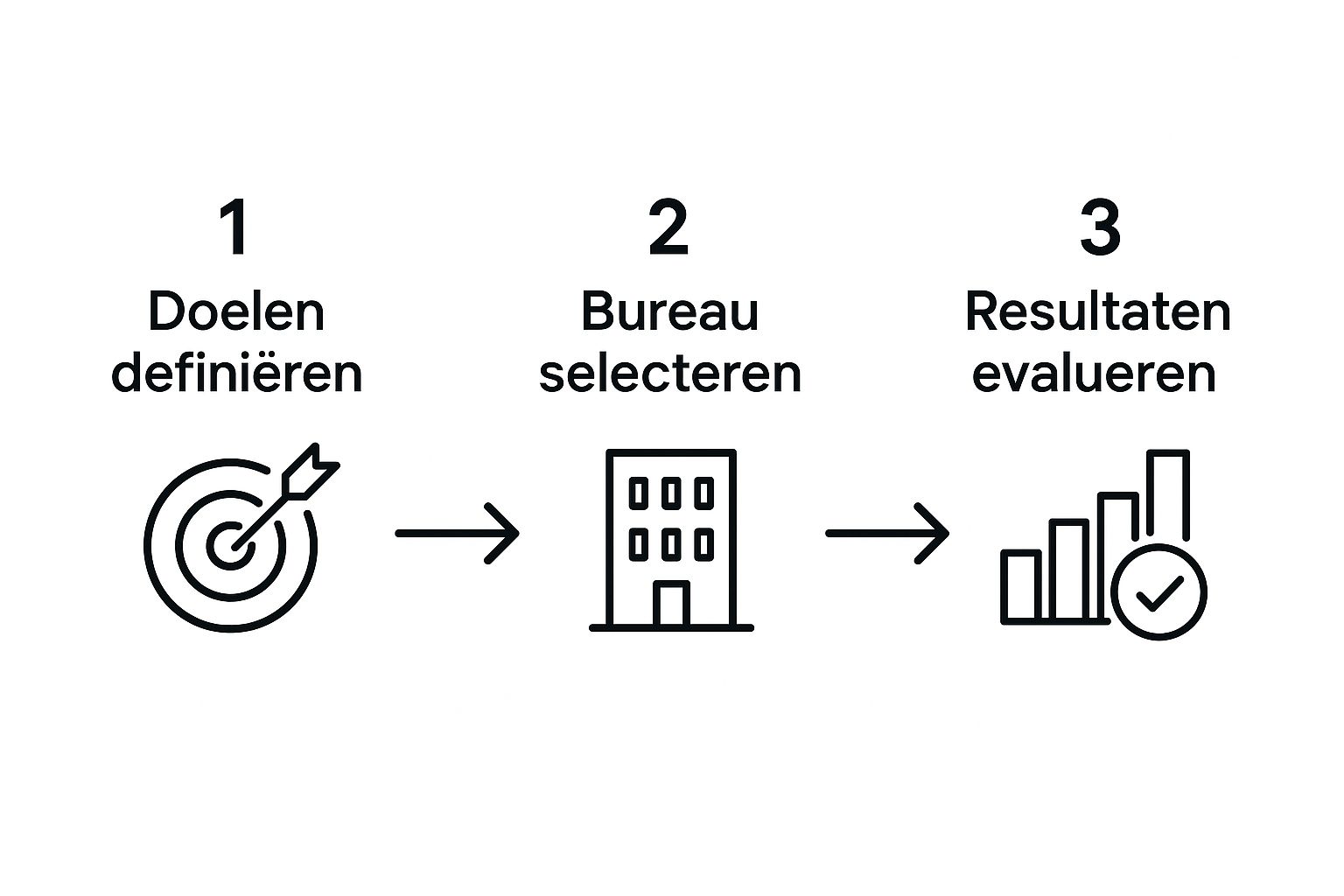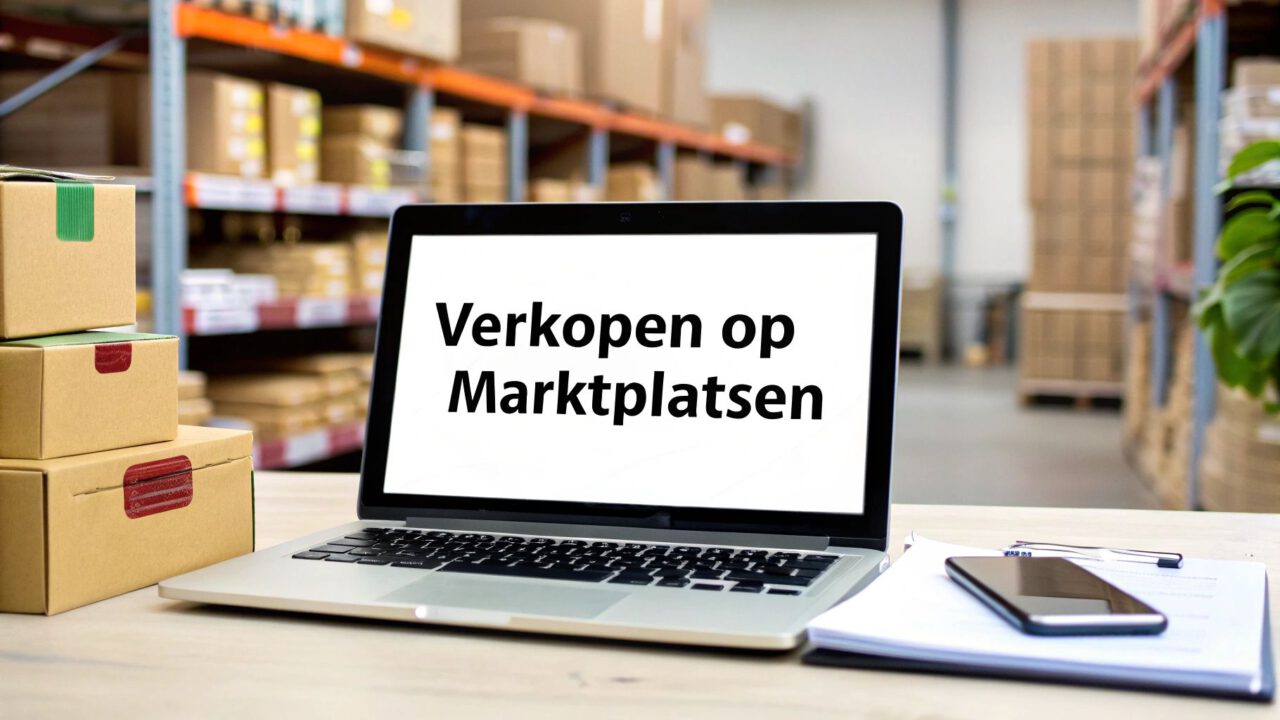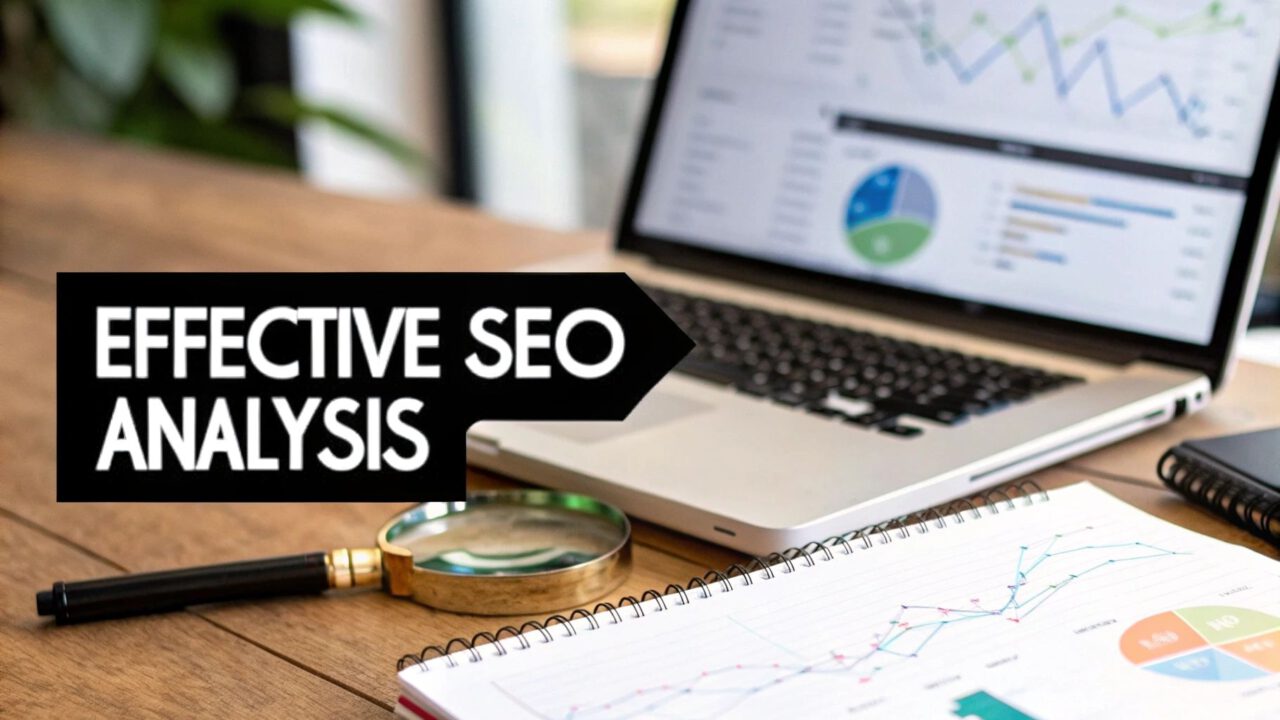As an entrepreneur, you're constantly trying to juggle everything. Sales, administration, and then you have to keep your social media up to date… It's a familiar story. But the harsh reality is that your marketing deserves more attention than those few hours left at the end of the day. Outsource online marketing is therefore not a luxury, but a smart, strategic move that gives your company the focus and expertise it needs to truly grow, based on a close partnership.
Why a marketing partner is much more than just an extra pair of hands

For many SMEs, the idea of outsourcing your marketing feels like losing some control. But you don't just throw the tasks over the fence; you take on a strategic partner On board. Such a partner isn't just an executive who ticks off tasks, but a team of specialists who proactively thinks along with you, advises you, and considers your business goals as their own. It's a collaboration that feels seamlessly like an extension of your own team.
Focus on collaboration and in-depth expertise
An external partner brings a wealth of experience gained across numerous sectors. They're constantly working with evolving algorithms, new tools, and the latest trends. Let's be honest: maintaining that knowledge alongside your core daily tasks is impossible.
Imagine a growing installation company. The owner is a skilled tradesman, but struggles to reach new customers online. By outsourcing their online marketing to a partner, they don't just get one marketer. They gain access to an entire team:
- A SEO specialist which ensures that the website is finally found well in Google.
- A content creator who shares engaging project photos and stories from satisfied customers.
- A advertising expert which sets up highly targeted campaigns for specific services, such as heat pumps or solar panels.
This collective brain, working closely with you, has a much greater impact than any single internal employee can ever achieve.
A surprisingly smart financial move
Besides the expertise, there's also a clear financial advantage. In Belgium, more and more SMEs are choosing outsourcing because it's simply more cost-efficient than hiring a full-time marketer. A ready-made online marketing package from an agency often starts around the €1020 per monthThat's considerably lower than the salary and associated employer costs for a permanent employee. Want to know more? Then read on about the outsourcing online marketing costs.
Let's put the numbers side by side.
Cost comparison internal marketer vs external agency
A head-to-head comparison of the annual costs and benefits of hiring an in-house marketer versus outsourcing to an agency.
| Aspect | Internal Marketer | External Marketing Agency |
|---|---|---|
| Annual gross salary | €48,000 – €60,000 (excl. employer charges) | €12,240 – €30,000 (depending on the formula) |
| Additional costs | Holiday pay, 13th month, insurance, pension | None, all-in price |
| Expertise | Limited to one person | Access to a team of specialists (SEO, SEA, etc.) |
| Tools & software | Must be purchased separately | Included in the price |
| Flexibility & scale | Permanent contract, difficult to scale up or down | Flexible contracts, easily adaptable |
| Continuity | Risk in case of illness or departure | Guaranteed continuity |
As you can see, choosing an agency is not only financially attractive in the short term, but it also offers more flexibility and a wider range of expertise.
A good partnership isn't a cost, but an investment in growth. You don't pay for hours, but for results, flexibility, and the peace of mind that your online presence is in professional hands.
Ultimately, outsourcing your online marketing gives you back your freedom. You free yourself from a task that requires a tremendous amount of time and specialized knowledge. This frees you up to focus on what you do best: running your business and providing your customers with the very best service. It's simply the most efficient path to sustainable online growth.
First focus on your goals, then find a partner

Many entrepreneurs begin their search for a marketing agency with a vague idea. "We need to do more online" or "we want to be more visible." Understandable, but it's the wrong start. Before you contact a single agency, you need to ask the right internal questions. What do you want? Real reaches?
Without clear goals, you're sailing blind. You can't possibly judge whether the proposals you receive are valid. The very best partnerships don't start with hunting for an agency, but with a crystal-clear understanding of your own needs.
A wish like "increased online visibility" simply isn't enough. A good partner needs concrete input to build a strategy together that actually delivers results. So think about specific, measurable goals. For example, do you want within six months 20% more quotation requests Through the website? Or do you want to double sales of a specific product category?
When you define your goals this clearly, the dynamic immediately shifts. You're no longer a client purchasing a service, but an equal partner in a project. You set the destination, and your partner uses their expertise to chart the best course. This way, you proactively work together toward measurable success.
Make your marketing goals SMART
The best way to move from vague wishes to concrete plans? The SMART principle. This method is a classic, and for good reason. It forces you to clearly and realistically write down your goals.
Every goal must meet these five criteria:
- Specifically: What do you want precisely achieve? Don't say 'more leads', say 'more qualified leads for product X via the website'.
- Measurable: How do you know if you're successful? Put numbers to it, like an increase of 15% or 50 new contact requests.
- Acceptable: Does everyone in the company support this goal? Support is essential.
- Realistic: Is this goal achievable with your budget and resources? Be ambitious, but honest.
- Time-bound: By when should the goal be achieved? A deadline creates focus.
A clearly defined goal isn't just crucial when selecting an agency. It becomes the guiding principle throughout the entire collaboration – the benchmark against which all efforts and results are measured.
A well-structured briefing based on SMART goals is the key to efficient collaboration. It saves you a significant amount of time, prevents misunderstandings, and ensures your marketing budget delivers results from day one.
Analyze your current situation
Before you head out the door, it's best to take a look in the mirror. What have you tried so far in marketing? What worked well, and what was a waste of time? An honest analysis of your efforts, budget, and available resources will give an external partner a flying start.
No idea where to start? Tools like Google Trends are a goldmine. For example, you can use them to see search interest in your products or services over a longer period.

You might discover a seasonal peak you can capitalize on, or see a rise in general interest in your sector. These kinds of insights are invaluable to your future partner.
Finally, don't forget to consider financial support. Did you know, for example, that you can contact the subsidies from the SME portfolioThis can give your budget a serious boost. With this thorough preparation, you'll be much more confident in your discussions and can better assess the agencies' proposals against your company's actual needs.
Finding the right match for smooth cooperation

With your goals and a sharp briefing in hand, it's time for the next step: finding the perfect partner. It's easy to be dazzled by a stunning portfolio or a glowing client list. But I can tell you from experience: a successful collaboration doesn't hinge on the most beautiful presentation. It's all about connecting, open communication, and mutual trust.
You're not just looking for a supplier, but an extension of your team. A partner who understands your company culture, thinks proactively, and speaks the same language. That chemistry is essential for smooth, long-term collaboration. It's the glue that ensures you understand each other and can work together efficiently to achieve results.
Look beyond the case studies
Of course, every agency proudly showcases its success stories. But it's up to you to critically analyze those shiny numbers. A truly good case study shows not only the end result, but also the journey to get there. How exactly did they approach the challenge? What obstacles did they encounter, and—more importantly—how did they tackle them together with the client?
So, during conversations, ask about their specific role and the collaboration. Were they fully responsible for the strategy, or did they only execute a small part? That will give you a much more honest picture of their actual expertise.
A reliable partner is willing to be open about both successes and failures. If an agency only talks about flawlessly executed projects, that's often a red flag. True partnerships thrive on honesty and transparency.
Also pay close attention to the promises they make. An agency that gives you a 'guaranteed number 1"ranking in Google" promises should be taken with a grain of salt. No one can guarantee something like that. A realistic and honest partner will provide a fair picture of the possibilities and the time needed to see results.
Asking the right questions in the introductory meeting
The first conversation is the perfect opportunity to gauge a good fit. Think of it as a first date for your company. You don't just want to test their knowledge, but especially to understand their way of thinking and collaborating.
Prepare a few targeted questions to see how they react and whether they're a good fit for you. For example:
- What does your ideal customer and collaboration look like? This immediately reveals whether they have experience with companies like yours and whether your expectations are somewhat aligned.
- Who will be our permanent contact person and how do we keep in touch? Clear lines of communication and a permanent contact person are essential for smooth, personal cooperation and prevent a lot of frustration.
- Suppose the results are disappointing, how will you tackle this together with us? The answer to this question demonstrates their proactiveness and problem-solving skills. Do they run away or roll up their sleeves and work together to find a solution?
- Based on our briefing, what would you do differently or better? A good partner thinks critically and dares to challenge you. They don't just nod "yes" to everything you propose.
These questions help you gain a much deeper understanding. They reveal whether an agency is investing in a lasting relationship and willing to grow with you. Ultimately, an agency's expertise is important, but it's the collaboration—smooth, respectful, and transparent—that truly makes the difference.
A Smooth Start: The Foundation for a Successful Partnership
Okay, the decision is made: you've found the ideal marketing partner. You click, their expertise shines, and you're optimistic about the future. Great! But now the key is: how do you translate that positive energy into concrete results? A good start is crucial.
The secret lies in a smooth and transparent onboarding process. This is the perfect opportunity to fully immerse your new partner in the world of your company. It's much more than just sending documents; it's about everyone pulling in the same direction from day one. A smooth start prevents misunderstandings and immediately lays the foundation for a productive and enjoyable collaboration.
The blueprint for a rock-solid collaboration
If there's one thing I've learned, it's that a lasting partnership hinges on crystal-clear communication. From the very first contact, expectations must be crystal clear on both sides. And no, I'm not talking about a weekly email update. You need a real, structured communication plan that fosters collaboration.
What does that mean? Schedule regular meetings. A short weekly check-in and a more extensive monthly strategy session often work perfectly. Also, use a shared project management tool like Trello or Asana. This keeps progress transparent for everyone, and you know exactly who's doing what, which facilitates collaboration.
A crystal-clear briefing is essential. Don't just share your goals; delve deeper. Explain your brand values, who your target audience truly is, and where you want to go with your company. The more context your partner has, the better they can align their strategy with what makes your company unique.
The process below nicely illustrates how a structured approach leads to much better collaboration and evaluation.

This just goes to show: a successful partnership isn't a fluke. It's the result of a well-thought-out process that begins long before the first campaign goes live.
Record the agreements in a watertight manner
Besides smooth communication, a solid contract is the backbone of your collaboration. Don't view this document as a formality, but as a shared manual. It creates clarity and prevents difficult discussions later on.
A good contract is more than just a price and a term. It establishes the rules of the collaboration. Consider:
- Concretely defined deliverables: What exactly will the agency do for you? Is it about 4 blog posts per month, managing advertising campaigns with a specific budget, or a complete SEO optimization of your website? Be specific.
- Measurable KPIs: How do we measure success? Define the Key Performance Indicators (KPIs) that matter to you. Think of the number of qualified leads, the conversion rate on a specific page, or your Google rankings.
- Reporting frequency: When and how will you gain insight into the results? Agree on whether you'll receive a weekly dashboard update or a comprehensive monthly report.
An overview of the essential components that should not be missing in the collaboration agreement with your marketing partner.
Checklist for a watertight marketing contract
| Element | Why it's important | Sample clause |
|---|---|---|
| Detailed Scope of Work (SoW) | Prevents misunderstandings about what exactly is delivered. | “Agency X delivers monthly: 4 SEO-optimised blog articles of at least 800 words, 2 social media posts per week on platforms Y and Z, and management of Google Ads campaigns with an advertising budget of € XXX.” |
| Key Performance Indicators (KPIs) | Makes success measurable and objective. | "The goal is to achieve a 20% increase in organic traffic and a Cost Per Lead (CPL) of up to €50 within 6 months." |
| Reporting & Communication | Ensures transparency and a consistent rhythm in collaboration. | “Agency X delivers a performance report via email on the first Monday of every month and schedules a monthly review call.” |
| Duration & Termination Conditions | Provides clarity about the term and the rules upon termination. | This agreement is entered into for an initial period of 12 months and can be cancelled on a monthly basis with 30 days' notice. |
| Intellectual Property | Determines who owns the content and materials created. | “All content created by Agency X (texts, images, etc.) will become the full property of Client Y after full payment of the invoices.” |
| Payment terms | Provides clarity about invoicing and payment terms. | Invoicing is done monthly in advance, with a payment term of 14 days after the invoice date. |
A good contract is your shared anchor. It ensures both parties know where they stand, what the expectations are, and what success looks like.
A watertight contract protects both parties and creates a secure foundation from which to build. It's not a sign of mistrust, but rather proof of professionalism and the intention to build a serious, long-term relationship.
Don't forget the practical matters, such as cancellation terms and agreements regarding intellectual property. Who owns the content being created? And what happens if one of the parties wants to end the collaboration? By establishing this upfront, you create peace of mind and focus. For some services, it can also be helpful to check whether your partner is recognized for subsidies; for example, read how Expert media achieved certification for the SME portfolio and what that can mean for you.
Growing together: how to get the most out of collaboration
The contract is in, the plans are on the table. Great, but now the real work begins. A successful collaboration with a marketing agency isn't a one-time transaction. It's a living partnership that requires attention and open dialogue. You can't just throw the marketing over the fence and hope for the best; it's a collaborative effort that must come from both sides.
The challenge is to stay involved without falling into micromanagement. You don't have to control every step, but it's crucial that you understand what's happening and why. The reports you receive from your partner serve as your shared compass.
But be careful: don't get hung up on so-called "vanity metrics" like the number of followers or likes. They look nice, but they say little about the impact on your business. Instead, focus on the Key Performance Indicators (KPIs) that really matter.
- Cost Per Lead (CPL): What does a new, qualified application really cost you? This is a rock-solid indicator of efficiency.
- Customer Lifetime Value (CLV): How much does a customer earn you on average over the entire relationship? This is essential for your long-term strategy.
- Conversion rate: What percentage of your website visitors do what you want, like buy something or sign up?
By going through these figures together, you convert data into concrete action points. This not only helps you measure performance, but also helps you identify new opportunities. For example, if you want to determine chances of ranking in GoogleThese KPIs provide the perfect basis for that discussion.
Create a culture of open feedback
The best results come from an open and honest feedback culture. And that's absolutely a two-way street. You know your market and your customers inside and out; your input is invaluable to your partner. If you notice that certain content isn't resonating or that the quality of leads is lagging, address it constructively.
Conversely, you should also be open to your partner's expertise. They have a fresh perspective and the data to back up their advice. Sometimes they'll propose a strategy that might be outside your comfort zone. Trust their knowledge and dare to take that leap together.
Don't think of it as a customer-supplier relationship, but as a true partnership. Success depends on mutual respect, transparency, and a shared drive to achieve the best results.
An interesting concept that aligns perfectly with this is the "team-as-a-service" model. This model provides you with a flexible team of specialists who function almost as an extension of your own organization. It combines the benefits of outsourcing with the involvement of an internal team. Hybrid Agency is an example of an agency that works this way and combines flexibility with measurable results.
Set fixed evaluation times in the agenda
To stay on top of things, regular evaluations are essential. For example, schedule a monthly strategy session. This is the perfect opportunity to discuss results, celebrate successes, and fine-tune plans for the coming period.
Such a meeting is much more than a formality; it's the engine of your shared growth. By consistently meeting together, the strategy remains relevant and you can be sure everyone is on the same page. This way, you build a lasting relationship that grows with your company and delivers results time and again.
Any questions about outsourcing online marketing?
Deciding to outsource your online marketing is a big step. It's only natural that you have questions. We hear them every day from entrepreneurs like you. Let's clear up the most common doubts right away.
What should I budget for a marketing partner?
This is the question everyone asks, and the answer is always: "It depends." And that's a good thing. A fixed, generic price tag would mean you're paying for a one-size-fits-all solution, not for a customized strategy tailored to your business.
Your budget is determined by your ambitions, your industry, and the level of competition. A local installation company, for example, needs a very different budget to dominate its region than a national online store in a competitive market.
A good partner doesn't talk about costs, but about investments. The question isn't "what does it cost per month?" but "what's the return on every euro invested?" A smart strategy ensures that your budget, large or small, maximizes its return.
Am I not giving away all control?
No, quite the opposite! Working with a good agency doesn't mean handing over the keys to your marketing and blindly hoping for the best. You are and will remain the expert on your product, your customers, and your market. That knowledge is essential for the collaboration. The agency brings specialized marketing expertise.
You retain more control by organizing the partnership properly. Make clear agreements about this:
- Clear reporting that really tell you what's happening, without woolly language.
- Fixed consultation times to determine and adjust the course together.
- A direct line with a permanent contact person who knows your company inside and out.
In fact, effective collaboration actually strengthens your control. You no longer operate based on gut feeling, but, together with a team of experts, based on data and concrete insights.
When will we see the first results?
Let's be honest here: it all depends on the channels you choose. Patience is often a virtue, but in some areas, you can expect quick results.
A realistic view of the matter:
- Google Ads (SEA): This is the highway to visibility. Once your campaigns go live, you can virtually immediately expect more website visitors and leads.
- Search Engine Optimization (SEO) & Content Marketing: This is the marathon, not the sprint. You're building a solid foundation together for the long term. Count on a few months before you see a noticeable, sustainable increase in your organic findability.
A reliable partner will always be crystal clear about this. They won't promise you the moon, but will instead present a realistic timeline with clear milestones. This way, you know exactly where you stand and you're investing together in stable, future growth.
Ready to accelerate your online growth with a partner you can trust? At Expert media we have been combining for more than 21 years experience with a personal, no-nonsense approach that delivers results. Discover what we can do for your company.




